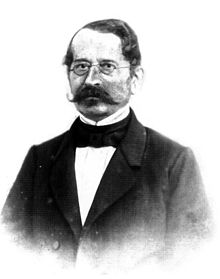Landtag Reuss younger line (1861–1864 / 65)
This article deals with the Reuss younger line of Parliament 1861–1864 / 65.
Parliament
The Reuss Younger Line Landtag was elected indirectly in four curiae:
- 1 viril vote for the owner of the Reuss-Köstritzer Paragium
- The owners of the 31 manors eligible for the state parliament elected 3 members
- The cities elected representatives (Gera 3, Schleiz and Lobenstein 1 each, Tanna, Saalburg, Hirschberg together 1)
- The rural population elected 3 MPs
The election of the electors took place on February 6, 1861, that of the deputies and their deputies on May 29, 1861.
The following were elected as MPs:
| Surname | place of residence | Curia | Constituency | annotation |
|---|---|---|---|---|
| Christian Leopold Hermann Ampach | on Leumnitz | Manor owner | ||
| Wilhelm Heinrich Broßmann | Schleiz | city | Schleiz | From March 17 to 18, 1864 he was Schlick's deputy |
| Julius Glass | Gera | city | Gera | Resigned from office on September 5, 1862. Successor: Shepherd |
| Johann Heinrich Philipp Greuner | Praise stone | city | Tanna, Saalburg, Hirschberg | Resigned from office on December 18, 1862. Successor: Heinrich Christian Gottlieb Tamm |
| Eduard Hagenbruch | on Söllmnitz | Reuss-Köstritzer Paragium | ||
| Julius Franz Hirt | Gera | city | Gera | From November 3, 1862 successor to Glaß |
| Karl Friedrich August Hoffmann | Praise stone | Rural population | District Office District Ebersdorf | From January 5, 1864 for Süßenguth |
| Karl Bernhard Jäger | Hirschberg / Saale | city | Tanna, Saalburg, Hirschberg | |
| Johann Gottlob Gustav Krötsch | on wickets | Manor owner | ||
| Heinrich Walther Reichard | Gera | city | Gera | |
| Heinrich Rohn | Instinct | Rural population | District Office District Schleiz | |
| Christian Karl Friedrich Sachse | Power village | city | Schleiz | |
| Georg August Schlick | Schleiz | Rural population | District Office District Gera | From March 15 to 18, 186 deputies for Saxons |
| Karl August Schmalz | Robes | city | Gera | |
| Heinrich Süßenguth | Praise stone | Rural population | District Office District Ebersdorf | Resigned from office on December 17, 1862. Successor: Hoffmann |
| Christoph Heinrich Tamm | Praise stone | city | Praise stone | Deputy for Greuner from December 15 to 18, 1862 |
| Heinrich Christian Gottlieb Tamm | Praise stone | city | Praise stone | Successor to Greuner from January 5, 1864 |
| Hugo Werner von Ziegenhierd | On Lichtenberg | Manor owner |
State Commissioner was Minister of State Adolph von Harbou . Under the senior president Eduard Hagenbruch, the state parliament elected Hermann Ampach as state parliament president (from December 2, 1862, this was Franz Hirt). Heinrich Süßenguth was elected as Vice President (from December 2, 1862 this was Hermann Ampach). Georg Schlick was the secretary. Deputy secretary was initially Heinrich Greuner and from February 25, 1863 Walther Reichard.
The state parliament met from May 18, 1862 to April 5, 1865 in 63 public plenary sessions in six session periods. The state parliament passed on April 5, 1865.
A state parliament committee was elected for the time between the session periods. This consisted of:
| Part of the country | member | Deputy | From ... to |
|---|---|---|---|
| Part of Gera | Julius Glass | Hermann Seifarth | until September 5, 1862 |
| Part of Gera | Hermann Seifarth | Walther Reichard | from November 5, 1862 |
| Part of Schleiz | Hermann Ampach | Georg Schlick | until March 9, 1863 |
| Part of Schleiz | Franz Hirt | Hermann Ampach | from March 9, 1863 |
| Lobenstein-Ebersdorf region | Heinrich Süßenguth | Heinrich Greuner | until March 9, 1863 |
| Lobenstein-Ebersdorf region | Heinrich Rohn | Bernhard Jäger | from March 9, 1863 |
literature
- Reyk Seela : Diets and regional representations in the Russian states 1848 / 67–1923. Biographical handbook (= Parliaments in Thuringia 1809–1952. Part 2). G. Fischer, Jena et al. 1996, ISBN 3-437-35046-3 , pp. 108-109, 339-340.

